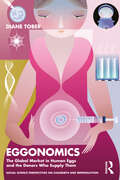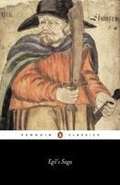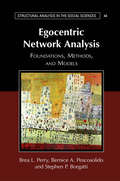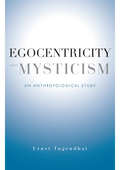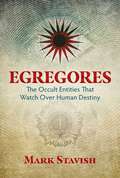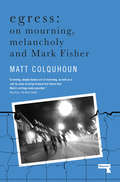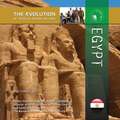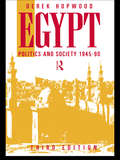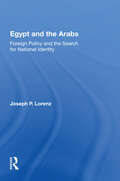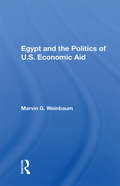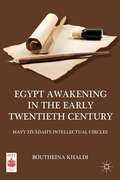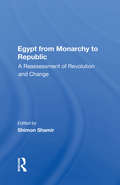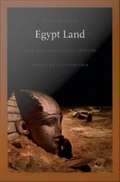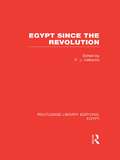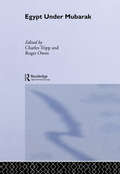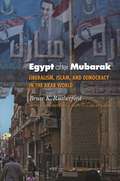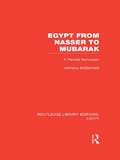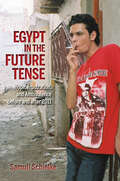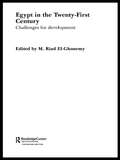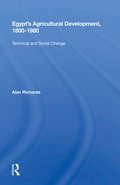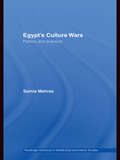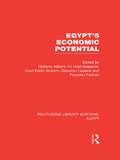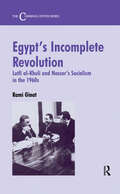- Table View
- List View
Eggonomics: The Global Market in Human Eggs and the Donors Who Supply Them (Social Science Perspectives on Childbirth and Reproduction)
by Diane M. ToberWhat happens when people are reduced to products? By pulling back the clinical curtain on the multi-billion-dollar per year global egg industry, that is the central question Eggonomics seeks to address. Tracing the emotional and physical journeys egg donors embark upon as suppliers of valuable commodities, this book reveals uncomfortable realities at the heart of the industry. Donors — and the eggs they provide — are absolutely essential to helping others create the families of their dreams. But not all clinics treat their donors as well as their paying patients, and many donors suffer as a result. Technological innovations allow the egg donation industry to expand, fueling the private equity incursion into fertility medicine, turning once-private clinics into highly profitable, multinational conglomerates. Drawing upon international anthropological fieldwork, Eggonomics reveals the clinical spaces where egg donor’s bodies are tested, prodded, and poked for ever-increasing sums of profit, eugenic forces drive donor selection, and the unrelenting pressures of global capitalism threaten medicine’s prime directive of ‘do no harm.’ Timely, meticulously researched, and written with surgical precision, Eggonomics is a crucial read for researchers, medical professionals, policymakers, and anyone considering becoming or using an egg donor.
Egil's Saga
by Bernard Scudder Svanhildur ÓskarsdóttirEgil’s Saga tells the story of the long and brutal life of tenth-century warrior-poet and farmer Egil Skallagrimsson: a morally ambiguous character who was at once the composer of intricately beautiful poetry, and a physical grotesque capable of staggering brutality. The saga recounts Egil’s progression from youthful savagery to mature wisdom as he struggles to avenge his father’s exile from Norway, defend his honour against the Norwegian King Erik Bloodaxe, and fight for the English King Athelstan in his battles against Scotland. Exploring issues as diverse as the question of loyalty, the power of poetry, and the relationship between two brothers who love the same woman, Egil’s Saga is a fascinating depiction of a deeply human character.
Egocentric Network Analysis: Foundations, Methods, and Models (Structural Analysis in the Social Sciences #44)
by Bernice A. Pescosolido Brea L. Perry Stephen P. BorgattiEgocentric network analysis is used widely across the social sciences, especially in anthropology, political science, economics, and sociology, and is increasingly being employed in communications, informatics, and business and marketing studies. Egocentric network analysis requires a unique set of data collection and analysis skills that overlap only minimally with other network methodologies. However, until now there has been no single reference for conceptualizing, collecting, and analyzing egocentric social network data. This comprehensive guide to study design, data collection, and analysis brings together the state of knowledge with the most effective research tools to guide newcomers to this field. It is illustrated with many engaging examples and graphics and assumes no prior knowledge. Covering the entire research process in a logical sequence, from conceptualizing research questions to interpreting findings, this volume provides a solid foundation for researchers at any stage of their career to learn and apply ego network methods.
Egocentricity and Mysticism: An Anthropological Study
by Ernst TugendhatIn Egocentricity and Mysticism, Ernst Tugendhat casts mysticism as an innate facet of what it means to be human—a response to an existential need for peace of mind. This need is created by our discursive practices, which serve to differentiate us from one another and privilege our respective first-person standpoints. Emphasizing the first person fuels a desire for mysticism, which builds knowledge of what binds us together and connects us to the world. Any intellectual pursuit that prompts us to "step back" from our egocentric concerns harbors a mystic kernel that manifests as a sense of awe, wonder, and gratitude. Philosophy, the natural sciences, and mathematics all engender forms of mystical experience as profound as any produced by meditation and asceticism. One of the most widely discussed books by a German philosopher in decades, Egocentricity and Mysticism is a philosophical milestone that clarifies in groundbreaking ways our relationship to language, social interaction, and mortality.
Egregores: The Occult Entities That Watch Over Human Destiny
by James Wasserman Mark StavishThe first book to explore the history and influence of egregores, powerful autonomous psychic entities created by a collective group mind • Examines the history of egregores from ancient times to present day, including their role in Western Mystery traditions and popular culture and media • Reveals documented examples of egregores from ancient Greece and Rome, Tibetan Buddhism, Islam, modern esoteric orders, the writings of H. P. Lovecraft and Kenneth Grant, and the followers of Julius Evola and Aleister Crowley • Provides instructions on how to identify egregores, free yourself from parasitic and destructive entities, and destroy an egregore, should the need arise One of most important but little known concepts of Western occultism is that of the egregore, an autonomous psychic entity created by a collective group mind. An egregore is sustained by belief, ritual, and sacrifice and relies upon the devotion of a group of people, from a small coven to an entire nation, for its existence. An egregore that receives enough sustenance can take on a life of its own, becoming an independent deity with powers its believers can use to further their own spiritual advancement and material desires. Presenting the first book devoted to the study of egregores, Mark Stavish examines the history of egregores from ancient times to present day, with detailed and documented examples, and explores how they are created, sustained, directed, and destroyed. He explains how egregores were well known in the classical period of ancient Greece and Rome, when they were consciously called into being to watch over city states. He explores the egregore concept as it was understood in various Western Mystery traditions, including the Corpus Hermeticum, and offers further examples from Tibetan Buddhism, Islam, modern esoteric orders such as the Order of the Golden Dawn and Rosicrucianism, the writings of H. P. Lovecraft and Kenneth Grant, and the followers of Julius Evola and Aleister Crowley. The author discusses how, even as the fundamental principles of the egregore were forgotten, egregores continue to be formed, sometimes by accident. Stavish provides instructions on how to identify egregores, free yourself from a parasitic and destructive collective entity, and destroy an egregore, should the need arise. Revealing how egregores form the foundation of nearly all human interactions, the author shows how egregores have moved into popular culture and media--underscoring the importance of intense selectivity in the information we accept and the ways we perceive the world and our place in it.
Egress: On Mourning, Melancholy and the Fisher-Function
by Matt ColquhounEgress is the first book to consider the legacy and work of the writer, cultural critic and cult academic Mark Fisher. Narrated in orbit of his death as experienced by a community of friends and students in 2017, it analyses Fisher&’s philosophical trajectory, from his days as a PhD student at the University of Warwick to the development of his unfinished book on Acid Communism. Taking the word &“egress&” as its starting point—a word used by Fisher in his book The Weird and the Eerie to describe an escape from present circumstances as experiences by the characters in countless examples of weird fiction—Egress consider the politics of death and community in a way that is indebted to Fisher&’s own forms of cultural criticism, ruminating on personal experience in the hope of making it productively impersonal.
Egypt (The Evolution of Africa's Major Nations)
by William Mark HabeebThe Egyptian civilization along the Nile River was one of the ancient world's earliest and most influential empires. From pyramids to mummies to hieroglyphs, the unique and mysterious lore of this region in northeastern Africa still engages the imagination. While much has changed over the centuries, Egypt remains a fascinating place. Traditionally, Egypt's moderate political stance in the Arab world has given the country a strategic place on the world stage and made it a stabilizing force in the Middle East. However, in 2011 Egypt underwent a revolution that ousted longtime president Hosni Mubarak from power. Today, Egypt faces political and economic uncertainty, as its newly elected government attempts to rule under the country's new constitution.
Egypt 1945-1990: Politics and Society
by Derek HopwoodFirst published in 1991. Routledge is an imprint of Taylor & Francis, an informa company.
Egypt And The Arabs: Foreign Policy And The Search For National Identity
by Joseph P LorenzAs the Arab states come to grips with new realities in the Middle East - the shifts in political and economic power in the region, the growing ascendency of fundamentalist Islam over Nationalist and pan-Arab ideologies of the past and the changing dynamics of the Palestinian problem - the course that Mubarak charts for Egypt has become a factor of key importance. In this book, a career Foreign Service officer examines the changes that are taking place in Egyptian attitudes and policies toward the Arab world from three perspectives - the ways in which Egypt pursued its regional interests under Nasser and Sadat, the policy constraints imposed by political, economic and social forces within Egypt, and the dynamics of Egyptian-Arab relations since the October War.
Egypt And The Politics Of U.s. Economic Aid
by Marvin G. WeinbaumThe massive U.S. economic aid program for Egypt initiated in 1975 resulted in a bilateral aid relationship shaped by the interaction of political and development goals. In this study of the program's origins and consequences, Professor Weinbaum describes its scope and identifies the constraints that delayed and limited program implementation. The author discusses the modest U.S. leverage designed to encourage economic reforms and argues that far-reaching reforms could only be attained through a major change in Egypt's political structure. He finds that, despite its failure to make Egypt more economically self-reliant, U.S. assistance has enabled the country to attain a level of consumption and development planning possible with no other alternative. The profit to the United States results from the regime's moderate foreign policies and compatible views on strategic threats to the region. Despite the mutual benefits of this aid program, Professor Weinbaum concludes that the United States must display greater sensitivity to Egypt's political and economic problems if the "special relationship" is to survive through the 1980s.
Egypt Awakening in the Early Twentieth Century
by Boutheina KhaldiThrough a detailed study of Mayy Ziy?dah's literary salon, Boutheina Khaldi sheds light on salon and epistolary culture in early twentieth-century Egypt and its role in Egypt's Nahdah (Awakening). Bringing together history, women's studies, Arabic literature, post-colonial literature, and media studies, she highlights the important and previously little-discussed contribution of Arabic women to the project of modernity.
Egypt From Monarchy To Republic: A Reassessment Of Revolution And Change
by Shimon ShamirAn examination of the extent to which Nasser's 1952 coup d'etat brought about significant changes in the basic social, political and cultural structures of Egypt.
Egypt Land: Race and Nineteenth-Century American Egyptomania
by Scott TraftonEgypt Land is the first comprehensive analysis of the connections between constructions of race and representations of ancient Egypt in nineteenth-century America. Scott Trafton argues that the American mania for Egypt was directly related to anxieties over race and race-based slavery. He shows how the fascination with ancient Egypt among both black and white Americans was manifest in a range of often contradictory ways. Both groups likened the power of the United States to that of the ancient Egyptian empire, yet both also identified with ancient Egypt's victims. As the land which represented the origins of races and nations, the power and folly of empires, despots holding people in bondage, and the exodus of the saved from the land of slavery, ancient Egypt was a uniquely useful trope for representing America's own conflicts and anxious aspirations. Drawing on literary and cultural studies, art and architectural history, political history, religious history, and the histories of archaeology and ethnology, Trafton illuminates anxieties related to race in different manifestations of nineteenth-century American Egyptomania, including the development of American Egyptology, the rise of racialized science, the narrative and literary tradition of the imperialist adventure tale, the cultural politics of the architectural Egyptian Revival, and the dynamics of African American Ethiopianism. He demonstrates how debates over what the United States was and what it could become returned again and again to ancient Egypt. From visions of Cleopatra to the tales of Edgar Allan Poe, from the works of Pauline Hopkins to the construction of the Washington Monument, from the measuring of slaves' skulls to the singing of slave spirituals--claims about and representations of ancient Egypt served as linchpins for discussions about nineteenth-century American racial and national identity.
Egypt Since the Revolution (Routledge Library Editions: Egypt)
by P. J. VatikiotisAs the leaders of a revolutionary, nationalist regime, the Egyptian Free Officers who came to power following the 1952 Revolution committed themselves to the attainment of goals associated with modernization, namely rapid economic development based on State planning and industrialization and the political mobilization of society along State-decreed lines. Arising from a conference held at the Centre of Middle Eastern Studies at SOAS, with contributions from scholars from the Arab world, Europe and the US as well as the UK, these papers raise the questions most important to students of economic and political development.
Egypt Under Mubarak (SOAS/Routledge Studies on the Middle East)
by Charles Tripp Roger OwenEgypt is one of the major powers in the Middle East. The vigour of its cultural life and the extent of its influence make it a force which cannot be ignored in the Arab world. Yet, despite the comparative confidence with which its rulers handle power, the country has a politically contradictory past with which to come to terms, as well as its role in a region of shifting political identity and allegiance. This book examines the causes and consequences of the many crises within the Egyptian political, sociological, economic and moral legacy and the strategies which Mubarak's government has devised to cope with that legacy. The book's concern is for the capacity of the present administration to avoid expediency and the generation of further crisis and rather to employ Egypt's considerable resources in the shaping of a distinct and effective role for the country.
Egypt after Mubarak: Liberalism, Islam, and Democracy in the Arab World (Princeton Studies in Muslim Politics #48)
by Bruce K. RutherfordWhich way will Egypt go now that Husni Mubarak's authoritarian regime has been swept from power? Will it become an Islamic theocracy similar to Iran? Will it embrace Western-style liberalism and democracy? Egypt after Mubarak reveals that Egypt's secularists and Islamists may yet navigate a middle path that results in a uniquely Islamic form of liberalism and, perhaps, democracy. Bruce Rutherford draws on in-depth interviews with Egyptian judges, lawyers, Islamic activists, politicians, and businesspeople. He utilizes major court rulings, political documents of the Muslim Brotherhood, and the writings of Egypt's leading contemporary Islamic thinkers. Rutherford demonstrates that, in post-Mubarak Egypt, progress toward liberalism and democracy is likely to be slow. Essential reading on a subject of global importance, this edition includes a new introduction by Rutherford that takes stock of the Arab Spring and the Muslim Brotherhood's victories in the 2011-2012 elections.
Egypt and the Limits of Hellenism
by Ian S. MoyerIn a series of studies, Ian Moyer explores the ancient history and modern historiography of relations between Egypt and Greece from the fifth century BCE to the early Roman Empire. Beginning with Herodotus, he analyzes key encounters between Greeks and Egyptian priests, the bearers of Egypt's ancient traditions. Four moments unfold as rich micro-histories of cross-cultural interaction: Herodotus' interviews with priests at Thebes; Manetho's composition of an Egyptian history in Greek; the struggles of Egyptian priests on Delos; and a Greek physician's quest for magic in Egypt. In writing these histories, the author moves beyond Orientalizing representations of the Other and colonial metanarratives of the civilizing process to reveal interactions between Greeks and Egyptians as transactional processes in which the traditions, discourses and pragmatic interests of both sides shaped the outcome. The result is a dialogical history of cultural and intellectual exchanges between the great civilizations of Greece and Egypt.
Egypt from Nasser to Mubarak: A Flawed Revolution (Routledge Library Editions: Egypt)
by Anthony McDermottEver since Nasser overthrew Prince Farouk in 1952, Egypt has held a special, leading position within the Arab world. It is now facing major problems, the most serious of which are the growing strength of the Muslim fundamentalists, continuing population growth and external debt problems. Together, these are creating a volatile and potentially explosive climate. In this book, the journalist Anthony McDermott examines the development of Egypt from Revolution to the present, describing various features of Egyptian society and the contributions of its leaders. He asks whether Egypt has fulfilled its expected role as the model for Arab and developing countries or whether the peace pact made by Sadat with Israel was a major error, causing Egypt’s withdrawal under Mubarak from the centre of international politics. The book is lively and readable and provides a challenging introduction to the development and problems of the largest country in the Middle East. First published 1988.
Egypt in Italy
by Molly Swetnam-BurlandThis book examines the appetite for Egyptian and Egyptian-looking artwork in Italy during the century following Rome's annexation of Aegyptus as a province. In the early imperial period, Roman interest in Egyptian culture was widespread, as evidenced by works ranging from the monumental obelisks, brought to the capital over the Mediterranean Sea by the emperors, to locally made emulations of Egyptian artifacts found in private homes and in temples to Egyptian gods. Although the foreign appearance of these artworks was central to their appeal, this book situates them within their social, political, and artistic contexts in Roman Italy. Swetnam-Burland focuses on what these works meant to their owners and their viewers in their new settings, by exploring evidence for the artists who produced them and by examining their relationship to the contemporary literature that informed Roman perceptions of Egyptian history, customs, and myths.
Egypt in the Future Tense: Hope, Frustration, And Ambivalence Before And After 2011 (Public Cultures Of The Middle East And North Africa Ser.)
by Samuli SchielkeAgainst the backdrop of the revolutionary uprisings of 2011-2013, Samuli Schielke asks how ordinary Egyptians confront the great promises and grand schemes of religious commitment, middle class respectability, romantic love, and political ideologies in their daily lives, and how they make sense of the existential anxieties and stalled expectations that inevitably accompany such hopes. Drawing on many years of study in Egypt and the life stories of rural, lower-middle-class men before and after the revolution, Schielke views recent events in ways that are both historically deep and personal. Schielke challenges prevailing views of Muslim piety, showing that religious lives are part of a much more complex lived experience.
Egypt in the Twenty First Century: Challenges for Development (Routledgecurzon Advances In Middle East And Islamic Studies #No.2)
by M. Riad El-GhonemyThe book focuses on three main themes:*overpopulation associated with low productivity, unemployment, persistent poverty and weak savings and investment capacity*the post-1950 development strategies and their outcomes*the institutional structures that are constraining economic and political progress. Egypt in the Twenty First Century is a much need
Egypt's Agricultural Development, 1800-1980: Technical And Social Change
by Alan RichardsThis book uses both microeconomic theory and social and political analysis to show how the interaction of social classes, technical change, government policy, and the international and state systems have shaped Egypt's agricultural development.
Egypt's Culture Wars: Politics and Practice (Routledge Advances in Middle East and Islamic Studies #Vol. 13)
by Samia MehrezThis ground-breaking work presents original research on cultural politics and battles in Egypt at the turn of the twenty first century. It deconstructs the boundaries between ‘high’ and ‘low’ culture drawing on conceptual tools in cultural studies, translation studies and gender studies to analyze debates in the fields of literature, cinema, mass media and the plastic arts. Anchored in the Egyptian historical and social contexts and inspired by the influential work of Pierre Bourdieu, it rigorously places these debates and battles within the larger framework of a set of questions about the relationship between the cultural and political fields in Egypt.
Egypt's Economic Potential (Routledge Library Editions: Egypt)
by Roberto AliboniOver the last ten years the Egyptian economy has undergone a major transformation which has led to greater decentralisation and international competition. This transformation, along with changing circumstances in the surrounding Arab areas and the end of hostilities with Israel, has given a boost to the Egyptian economy. Without underestimating the obstacles that still stand in the way of sustained economic growth and development, this book foresees a more optimistic outlook for Egypt than do other such studies carried out by international organisations such as the World Bank. Egypt’s Economic Potential argues that the main problem facing the Egyptian economy is that the government must resort to expensive public expenditure policies, in particular subsidising foodstuffs, in order to maintain the political consensus. This creates a savings gap which prevents the authorities from channelling savings towards financing the projects which will cerate economic growth. However, the book suggests that because the present regime is fundamentally stable and even further change at the top would be unlikely to alter the institutional framework of the country, the Egyptian economy has the potential for stable and rapid growth.
Egypt's Incomplete Revolution: Lutfi al-Khuli and Nasser's Socialism in the 1960s
by Rami GinatThe importance of Lutfi al-Khuli and the intellectual circle associated with the Nasserist regime is examined here. Rami Ginat looks at al-Khuli's contribution to the short-lived yet formidable success of Arab socialism.
